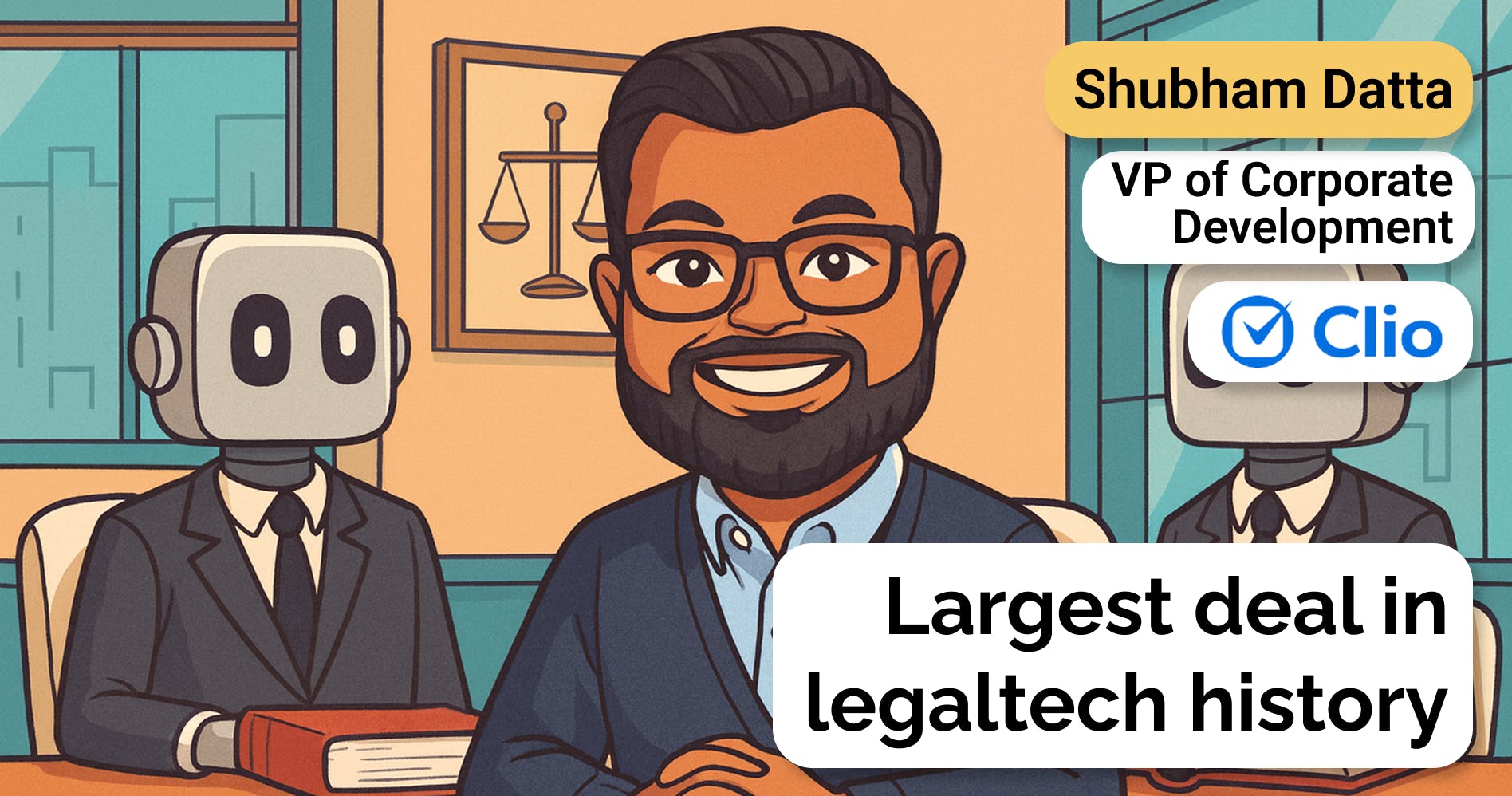Shubham Datta, VP of Corporate Development at Clio, on Clio's $1B acquisition of vLex
 Jan-Erik Asplund
Jan-Erik Asplund

Background
We last covered Clio when it hit $300M ARR in June 2025, up from $235M in 2024—sustaining 30%+ year-over-year growth at scale.
With the news of Clio’s $1B acquisition of legal database company vLex (founded 2000), we reached out to Shubham Datta, VP of Corporate Development at Clio, to learn more.
Key points via Sacra AI:
- Clio's $1B acquisition of vLex gives it the #3 legal research corpus behind only Westlaw ($2.9B revenue) and LexisNexis ($1.9B revenue)—with 1B+ cases from 200+ jurisdictions plus citations and annotations—enabling it to vertically integrate its AI assistant with the underlying data layer vs. relying on Lexis & Westlaw 3rd party APIs. "Today, we serve more than 200,000 legal professionals across firms of every size, from solos to enterprise. With the announced acquisition of vLex, we are extending this advantage into legal research. . . [W]e see the opportunity to fundamentally change how legal professionals access knowledge, process case work, operate their firms, and deliver client service.”
- Starting bottom up with solo practitioners and small & medium sized law firms, Clio has product retention & engagement from which it can expand into the enterprise by going more feature complete (with its ShareDo acquisition), compared with AI-native startups that go directly after biglaw customers, and risk getting trapped in bespoke consulting arrangements that don’t scale. "Most AI startups entering the legal market face a difficult reality. It is costly and complex to build tools that can scale across the full spectrum of legal professionals. As a result, many of them focus narrowly on large firms that have the budgets and capacity to adopt early. That approach may work commercially in the short term, but it leaves out the vast majority of the legal profession."
- Clio’s opportunity lies in going upmarket from SMB to enterprise, expanding from practice management to legal research (Westlaw & LexisNexis), and then crossing over from its core law firm customer to corporate in-house teams to eat up contract lifecycle management (Ironclad at $150M ARR & Icertis at $350M ARR), legal ops (SimpleLegal, acquired by Onit & Brightflag at €27M ARR when acquired by Wolters Kluwer) and more. "We believe that over time, legal ops software for in-house teams and practice management for law firms will increasingly converge. . . The traditional divide between in-house and outside counsel will continue to blur, and the ability to work seamlessly across both environments will become essential. . . Their workflows may differ, but the underlying challenges are the same: managing complexity, driving efficiency, controlling costs, and proving value.”
Questions
- What is Clio in short?
- What was Clio’s initial product-market fit and how has it expanded from that base over time?
- Talk to us about solo practitioners and small & medium sized law firms, their tech stack and their willingness to adopt new technology. How do they evaluate software and on what dimensions does Clio win?
- Clio is based in Canada. Does that give Clio an advantage in adoption with law firms outside of the U.S.? Have international law firms been more ready to adopt technology and what does the geographic breakdown look like for Clio?
- Talk to us about Clio’s acquisition of vLex and what it means about Clio’s expansion into legal research. What new opportunity set opens up to Clio as a result of acquiring vLex?
- Clio is moving into SaaS for biglaw firms. How are their needs similar to and different from the SMBs that make up Clio’s core customer base. What jump does Clio need to make to win in the enterprise?
- How does Clio think about expanding from law firms to corporate legal teams? Possible to use adoption by law firms to drive adoption by corporate in-house and vice versa?
- Clio has a law firm’s documents, tasks, client information and more—including entrenched workflows and engagement across a law firm. What advantage does that give Clio in building AI products versus AI-native startups?
- How does Clio think about building a winning AI product? Is it building a vertical fine-tuned model for legal or using off the shelf frontier models? What role does Clio’s proprietary data have? How important is innovation in product & interfaces? Agents?
- Clio has sustained 30%+ YoY growth even at hundreds of millions in revenue scale and multiproduct is a huge part of that. Why has Clio been so successful with multiproduct? How does Clio think about its expansion trajectory and what adjacent markets it intends to eat up over time?
- Over time, does legal ops SaaS for corporate in house converge or diverge from legal practice management for law firms?
- Over the next 5 years, what does Clio become and how has the world changed?
Interview
What is Clio in short?
Clio is the world's leading provider of cloud-based legal technology. We offer a comprehensive suite of software solutions that empower law firms and legal professionals to manage their practices, grow their businesses, and deliver better client experiences. At its core, Clio is the operating system for legal, streamlining everything from case and document management to client communication and payments.
What was Clio’s initial product-market fit and how has it expanded from that base over time?
Clio’s initial product-market fit was with solo practitioners and small firms, where we introduced the first cloud-based practice management system in 2008. At a time when the industry relied on costly, on-premise software, Clio offered a simple, secure, and accessible alternative that gave lawyers an affordable way to run their practices more effectively. This built a loyal customer base that became the foundation for our growth.
Over time, we’ve evolved into a multi-product company, expanding beyond practice management into client intake, CRM, payments, accounting, and document automation. With this growth, we’ve also moved upmarket to serve larger firms, a shift accelerated by our acquisition of ShareDo, a leading enterprise legal platform. Today, Clio supports firms of all sizes in more than 130 countries. And with the announced acquisition of vLex and the integration of AI across our platform, we’re extending the scope of how we support legal professionals and preparing for the next wave of innovation in the industry.
Talk to us about solo practitioners and small & medium sized law firms, their tech stack and their willingness to adopt new technology. How do they evaluate software and on what dimensions does Clio win?
Solo and small to medium-sized firms have historically relied on patchwork systems or even manual processes, but we are seeing a growing appetite for integrated, cloud-based solutions that make their practices more efficient and client-focused. These firms increasingly view technology as a lever for growth rather than just a cost of doing business, and their evaluation criteria reflect that. They look for tools that are easy to learn, affordable, and secure, with a clear return on investment and minimal disruption to their day-to-day work.
Clio stands out because we are purpose-built for the realities of these firms. Our platform serves as the secure system of record for the practice while remaining incredibly intuitive to adopt, which is why so many lawyers can get value from Clio on day one. At the same time, our ecosystem of more than 280+ integrated apps gives firms the flexibility to shape their technology stack around their unique needs as they grow. This balance of simplicity, security, and extensibility is why over 200,000 legal professionals worldwide trust Clio to run their practices.
Clio is based in Canada. Does that give Clio an advantage in adoption with law firms outside of the U.S.? Have international law firms been more ready to adopt technology and what does the geographic breakdown look like for Clio?
Being Canadian headquartered has given us a global-first mindset from the very beginning. We have always had to account for the nuances of different legal systems and jurisdictions, which has made our platform more adaptable and appealing to firms worldwide. The challenges of running a law practice are universal, but the day to day work is quite local. The advantages of cloud-based technology like greater efficiency, profitability, and client satisfaction resonate as just strongly in the UK, Australia, and Europe as they do in North America.
Today, Clio is used in more than 130 countries, supported by dedicated offices in Dublin and Sydney alongside our teams in Canada and the U.S. While the U.S. remains our largest market, international growth is a core part of our strategy, and with our announced acquisition of vLex, our combined reach now extends to legal professionals globally, including courts, Am Law 200 firms, law societies and bar associations. This breadth positions Clio uniquely as a truly global legal technology leader.
Talk to us about Clio’s acquisition of vLex and what it means about Clio’s expansion into legal research. What new opportunity set opens up to Clio as a result of acquiring vLex?
Our announced US$1 billion acquisition of vLex is transformational for both Clio and the legal industry. For the first time, the business of law and the practice of law are coming together on a single trajectory, creating a new category of intelligent legal technology that will redefine what lawyers can expect from their tools.
vLex brings unmatched global legal intelligence and AI-powered research, and when combined with Clio’s leadership in practice management, we see the opportunity to fundamentally change how legal professionals access knowledge, process case work, operate their firms, and deliver client service. This is not just the largest deal in legaltech history, it is a defining moment that accelerates Clio’s vision to build the most comprehensive legal technology company in the world.
Clio is moving into SaaS for biglaw firms. How are their needs similar to and different from the SMBs that make up Clio’s core customer base. What jump does Clio need to make to win in the enterprise?
Clio has long been the trusted platform for SMB law firms and we are building on that strength to serve the increasingly complex needs of larger organizations. At their core, both small and large firms require strong case management, billing, and document management. The difference lies in scale and flexibility: enterprise firms operate with more complex workflows, different compliance standards, and a greater need for customization and integration with other enterprise systems.
To win in this space, Clio is making deliberate investments. Our acquisition of ShareDo in Q1 2025 reflects our commitment to delivering enterprise-grade workflow and matter management. We are continuing to enhance scalability, security, and performance to support the demands of the largest firms, while expanding integration capabilities to fit seamlessly into the broader enterprise tech stack. Just as importantly, we are investing in the sales and customer success expertise required to deliver the high-touch, consultative support enterprise clients expect. This combination of product innovation and partnership positions Clio to become the trusted SaaS provider for firms of every size, from solos to the largest global practices.
How does Clio think about expanding from law firms to corporate legal teams? Possible to use adoption by law firms to drive adoption by corporate in-house and vice versa?
Clio’s primary focus has been on serving law firms, but we see corporate legal teams as an important opportunity. Although their contexts differ, corporate legal teams and law firms both grapple with challenges like managing heavy workloads, keeping costs under control, and showing clear value to their clients or the business. While some in-house teams already use our platform, we see greater potential to support them through a highly flexible system that is particularly well-suited to the complex workflows of corporate legal departments.
Over time, this creates natural synergies across the ecosystem. In-house teams using our platform can collaborate more seamlessly with outside counsel already onboard, and vice versa. That connectivity reflects the larger vision we are building toward: a legal technology company that supports the entire legal experience, across firms, clients, and corporate legal departments alike.
Clio has a law firm’s documents, tasks, client information and more—including entrenched workflows and engagement across a law firm. What advantage does that give Clio in building AI products versus AI-native startups?
Clio has a unique advantage in building AI because our platform is deeply embedded in how law firms operate. We support everything from documents and client information to tasks, billing, and workflows, which gives us a comprehensive understanding of the context in which legal work gets done. This creates a defensible data moat and allows us to build AI that is accurate, practical, and immediately valuable to legal professionals.
Most AI startups entering the legal market face a difficult reality. It is costly and complex to build tools that can scale across the full spectrum of legal professionals. As a result, many of them focus narrowly on large firms that have the budgets and capacity to adopt early. That approach may work commercially in the short term, but it leaves out the vast majority of the legal profession.
Clio has spent 17 years building the infrastructure to take a different path. Today, we serve more than 200,000 legal professionals across firms of every size, from solos to enterprise. With the announced acquisition of vLex, we are extending this advantage into legal research. vLex is a trusted legacy company with a vast global library of legal intelligence, and its Vincent AI product has the trajectory of a startup. Vincent is fast-moving, innovative, and already recognized as one of the most capable AI assistants in the legal market. That combination of scale, credibility, and agility, paired with Clio’s reach and expertise in the business of law, positions us to deliver AI that advances both the business and practice of law.
How does Clio think about building a winning AI product? Is it building a vertical fine-tuned model for legal or using off the shelf frontier models? What role does Clio’s proprietary data have? How important is innovation in product & interfaces? Agents?
Clio’s approach to building a winning AI product is deliberate and multi-layered. We believe the best path combines the power of frontier models with our own vertically fine-tuned models, giving us the ability to harness the latest breakthroughs while tailoring AI to the specific language, workflows, and requirements of the legal profession.
We bring nearly two decades of experience supporting the documents, matters, tasks, workflows, and business operations of law firms, including productivity, billing, and collections. This context allows us to design AI that goes beyond generic outputs to deliver practical capabilities like workflow automation, predictive insights, and context-aware assistance.
Equally important is product and interface innovation. AI must be intuitive, trusted, and seamlessly integrated into how lawyers already work. We are focused on building solutions that feel less like a tool and more like a partner. The next frontier is agentic AI, where technology does not just respond to prompts but proactively supports lawyers, anticipating their needs and freeing them to focus on higher-value work. That is the future of legal AI Clio is building toward: powerful, practical, and deeply human-centered.
Clio has sustained 30%+ YoY growth even at hundreds of millions in revenue scale and multiproduct is a huge part of that. Why has Clio been so successful with multiproduct? How does Clio think about its expansion trajectory and what adjacent markets it intends to eat up over time?
Clio’s success with a multi-product strategy comes from staying relentlessly focused on solving the real challenges lawyers face. We do not build products in isolation. Every addition to our platform is designed to address pain points we hear directly from our customers and to extend the value of the core system they already rely on. That is why adoption of new products has been so strong: each one feels like a natural extension of the Clio experience, not another piece of disconnected software.
The announced acquisition of vLex marks a major milestone in this evolution. It reflects the next stage of our ambition to support both the business and practice of law, and it shows the scale of what is possible as we create a new category of legal technology that transforms how legal work gets done.
Looking ahead, our expansion trajectory is about continuing to broaden the platform in ways that make Clio the essential solution for legal professionals. We see significant opportunities in adjacent markets like payments, accounting, and legal research, and we will continue to expand through both organic innovation and strategic acquisitions. The goal is not just to add products, but to knit them together into a platform that delivers compounding value and establishes Clio as the single source of truth for the entire legal industry.
Over time, does legal ops SaaS for corporate in house converge or diverge from legal practice management for law firms?
We believe that over time, legal ops software for in-house teams and practice management for law firms will increasingly converge. Their workflows may differ, but the underlying challenges are the same: managing complexity, driving efficiency, controlling costs, and proving value.
As technology advances, the tools serving each side will begin to overlap, creating shared standards for collaboration, transparency, and possibly in the future, data exchange. The traditional divide between in-house and outside counsel will continue to blur, and the ability to work seamlessly across both environments will become essential. Clio is uniquely positioned to meet that moment by supporting the needs of each segment while acting as the connective tissue that brings the broader legal ecosystem together.
Over the next 5 years, what does Clio become and how has the world changed?
Over the next 5 years, Clio will become the indispensable platform for the entire legal ecosystem. Our platform will be the central hub for all legal work, from the initial client intake to the final resolution of a matter.
But the real change we're driving is much bigger than just technology. The World Justice Project found that a staggering 77% of legal problems don't receive the legal help they need. This is a massive access to justice gap that we are determined to close. With advancements in AI integrated deeply into our platform, we can start to chip away at this problem by making legal services more approachable, affordable, and accessible for everyone.
The world will be changed because lawyers will be empowered to operate more efficiently, allowing them to serve more clients and focus on the high-value work that truly requires their expertise. Technology will handle the administrative and repetitive tasks, freeing up lawyers to be the counselors and advocates their clients need. This transformation will not only expand access to justice but will also strengthen the relationship between lawyers and their clients, leading to better outcomes for all.
Disclaimers
This transcript is for information purposes only and does not constitute advice of any type or trade recommendation and should not form the basis of any investment decision. Sacra accepts no liability for the transcript or for any errors, omissions or inaccuracies in respect of it. The views of the experts expressed in the transcript are those of the experts and they are not endorsed by, nor do they represent the opinion of Sacra. Sacra reserves all copyright, intellectual property rights in the transcript. Any modification, copying, displaying, distributing, transmitting, publishing, licensing, creating derivative works from, or selling any transcript is strictly prohibited.






